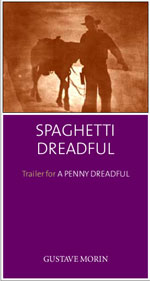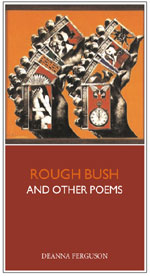 |
 |
This year's titles range from the visually sophisticated Concrete poetry of Gustave Morin, a native of Windsor who spent 10 years on his "novel" A Penny Dreadful, to an obscure volume of satirical translations of Baudelaire by the English poet Nicholas Moore, from the experiments in frame and format that Caroline Bergvall and designer Marit Muenzberg explore in their daring resetting of the poet's Eclat, to the equally daring, if entirely unscrupulous, logorrhea that is the 130 pages of another "novel," Name, by Toadex Hobogrammathon.
The big news this year might be the introduction of color into the pantheon of effects being used in our e-books: both Bergvall's Eclat and my own Alpha Betty's Chronicles rely heavily on it, in ways that would have been unsuitable to html and impossibly expensive to print in a book. Likewise, the volumes by Morin and Lytle Shaw - two of his uniquely low-tech Shark chapbooks - are primarily graphic works, while the titles by Craig Dworkin, Robert Fitterman and Larry Price attempt to re-conceptualize the page of an Adobe Acrobat file as a middle-space that ironizes the permanence of type (Dworkin's use of Courier fonts) or digital flow (Fitterman's box-like containers) as well as the "writing on the wall" soixante-huitard-style (Price's poster-style typography).
 |
Of the republications, we are happy to present the final section of Ron Silliman's The Age of Huts, The Chinese Notebook, probably the most influential of his early books outside of Kejtak, two small works by the increasingly-prized Jean Day, whose 1998 Atelos volume, The Literal World, woke so many up to her understated talents. Robert Kelly's quasi-fiction - yes, yet another "novel" - called The Cruise of the Pnyx has long been one of my favorites of his, but has never appeared in another book, nor has the original Station Hill edition of 1979 been republished.
New writers include the playwright Madelyn Kent, whose Shufu plays - part Butoh, part Richard Maxwell-like deadpan, with a touch of Clark Coolidge -- are bound to become recognized as innovative theater, and Aaron Kunin, who is becoming known in New York and elsewhere as a writer of uncommon intelligence and tremendous technical precision. The English poet Ira Lightman drops in on the series like a lightning bolt, spreading his art in a sort of spirit of personal renaissance, while Barbara Cole's Foxy Moron - a text I see as existing somewhere between poetry and drama if only because she reads it so well in public - strikes a little lower, not so much toward "renaissance" as sexual catharsis, over and over again.
Lastly, we are especially happy to have Deanna Ferguson's long-awaited follow-up collection to her 1993 book The Relative Minor (which appears as a reprint in last year's series). Several of the poems in Rough Bush have already played parts in some of the signal poetics statements of the nineties; it's good to finally have such a stash of Ferguson's recent writings in one place.
Enjoy!
Posted by Brian Stefans at April 20, 2004 12:29 PM | TrackBack